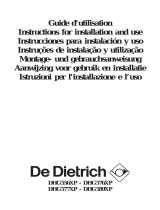
ENGLISH
WARNING
The distance between the supporting surface for the cooking worktop on the hob and the lower part of the hood
must be at least 65 cm. If the instructions for installation for the hob specify a greater distance, this has to be
taken into account.
The air collected must not be conveyed into a duct used to blow off smokes from appliances fed with an energy
other than electricity (central heating systems, thermosiphons, water-heaters, etc.).
Comply with the official instructions provided by the competent authorities in merit when installing the disposal
duct. In addition, exhaust air should not be discharged into a wall cavity, unless the cavity is designed for that
purpose.
The room must be well ventilated in case a hood and some other heat equipment fed with an energy other than
electricity (gas, oil, coal heaters, etc) operate at the same time.
The intake hood could create a vacuum indeed by extracting the air out the room. The vacuum should not exceed
0,04mbar. This prevents the head source to generate in-drawghts of gas that must be extracted out.
Check the data label inside the appliance; if the symbol ( ) is printed, read the following: this appliance
has such technical particularities that it belongs to class II insulation, therefore it must not be earthed.
The following warning is valid in the United Kingdom only: in case your cable is not furnished with a plug, read
the following instructions; as the colours of the wires in the mains lead of this appliance may not correspond with
the coloured markings identifying the terminals in your plug, proceed as follows: – the wire which is coloured blue
must be connected to the terminal which is marked with the letter N or coloured black; – the wire which is
coloured brown must be connected to the terminal which is marked with the letter L or coloured red. – terminal
of a three-pin plug.
Check the data label inside the appliance; if the symbol ( ) is NOT printed, read the following:
ATTENTION: This appliance must be earthed. When making the electrical connections, check that the current
socket has a ground connection.
The following warning is valid in the United Kingdom only: in case your cable is not furnished with a plug, read
the following instructions; as the colours of the wires in the mains lead of this appliance may not correspond with
the coloured markings identifying the terminals in your plug, proceed as follows:
– the wire which is coloured green and yellow must be connected to the terminal in the plug which is marked
with the letter E or by the earth symbol [
], or coloured green or green and yellow; – the wire which is coloured
blue must be connected to the terminal which is marked with the letter N or coloured black; – the wire which is
coloured brown must be connected to the terminal which is marked with the letter L or coloured red.
When making the electrical connections, check that the voltage values correspond to those indicated on the data
plate inside the appliance itself. In case your appliance is not furnished with a non separating flexible cable and
has no plug, or has not got any other device ensuring omnipolar disconnection from the electricity main, with a
contact opening distance of at least 3 mm, such separating device ensuring disconnection from the main must
be included in the fixed installation. If your unit features a power lead and plug, position this so the plug is
accessible.
Always switch off the electricity supply before carrying out any cleaning or servicing operations on the appliance.
USE
Avoid using materials which could cause spurts of flame (flambées) near the appliance.
When frying, take particular care to prevent oil and grease from catching fire. Already used oil is especially
dangerous in this respect. Do not use uncovered electric grates.
To avoid possible risks of fire always comply with the indicated instructions when cleaning anti-grease filters and
when removing grease deposits from the appliance.
MAINTENANCE
Thorough servicing guarantees correct and long-lasting operation.
Any fat deposits should be removed from the appliance periodically depending on amount of use (at least every
2 months). Avoid using abrasive or corrosive products. To clean painted appliances on the outside, use a cloth
dipped in lukewarm water and neutral detergent. To clean steel, copper or brass appliances on the outside, it
is always best to use specific products, following the instructions on the products themselves. To clean the inside
of the appliance, use a cloth (or brush) dipped in denatured ethyl alcohol.
DESCRIPTION
The hood may be installed in the ducting version. Ducting version (Fig. 1): The hood aspirates the kitchen air
saturated with fumes and odours, passes it through the grease filters and expels it to the outside through an outlet
pipe. With this version the charcoal filters are not required.
The 2-motor version hood is only available for ducting version installation.









